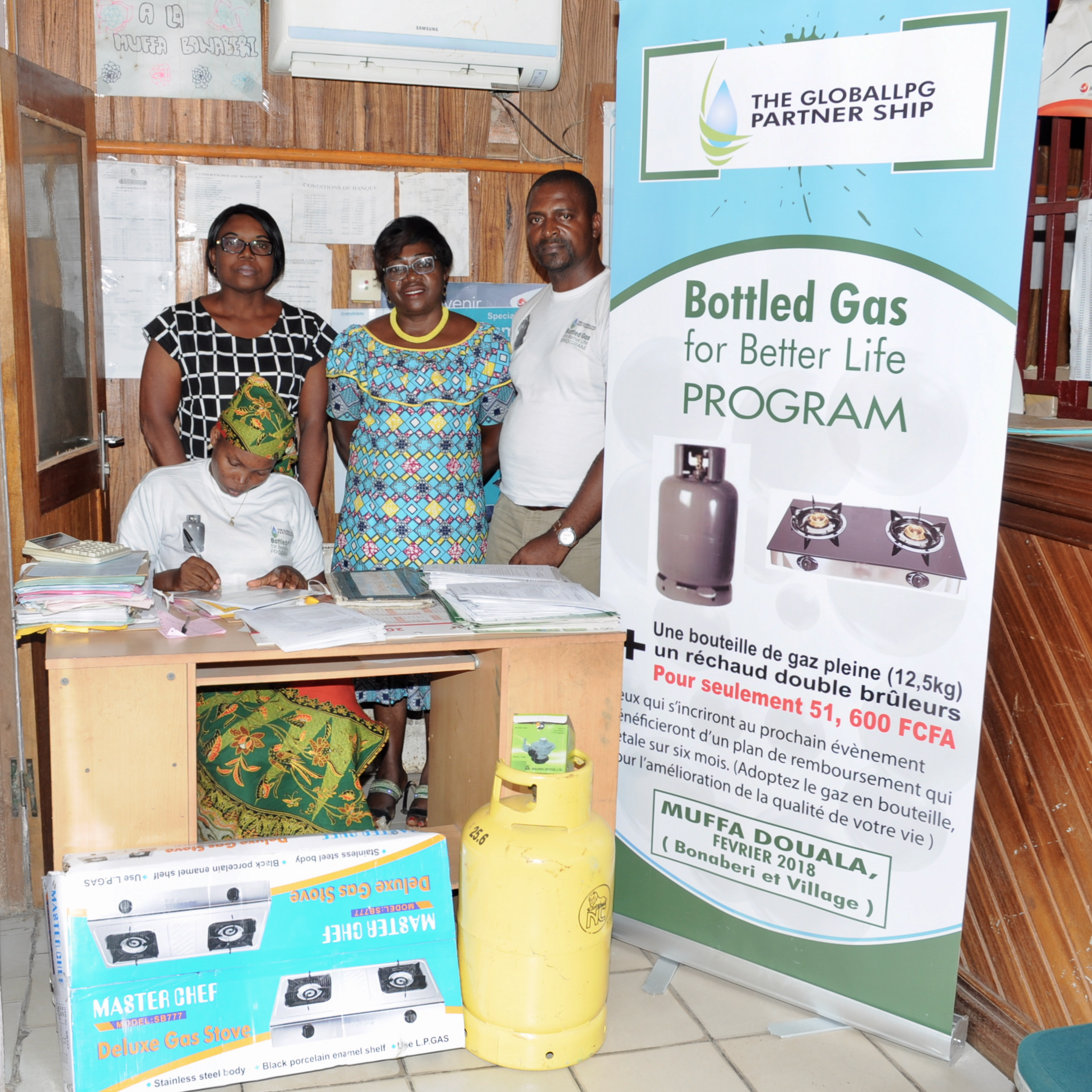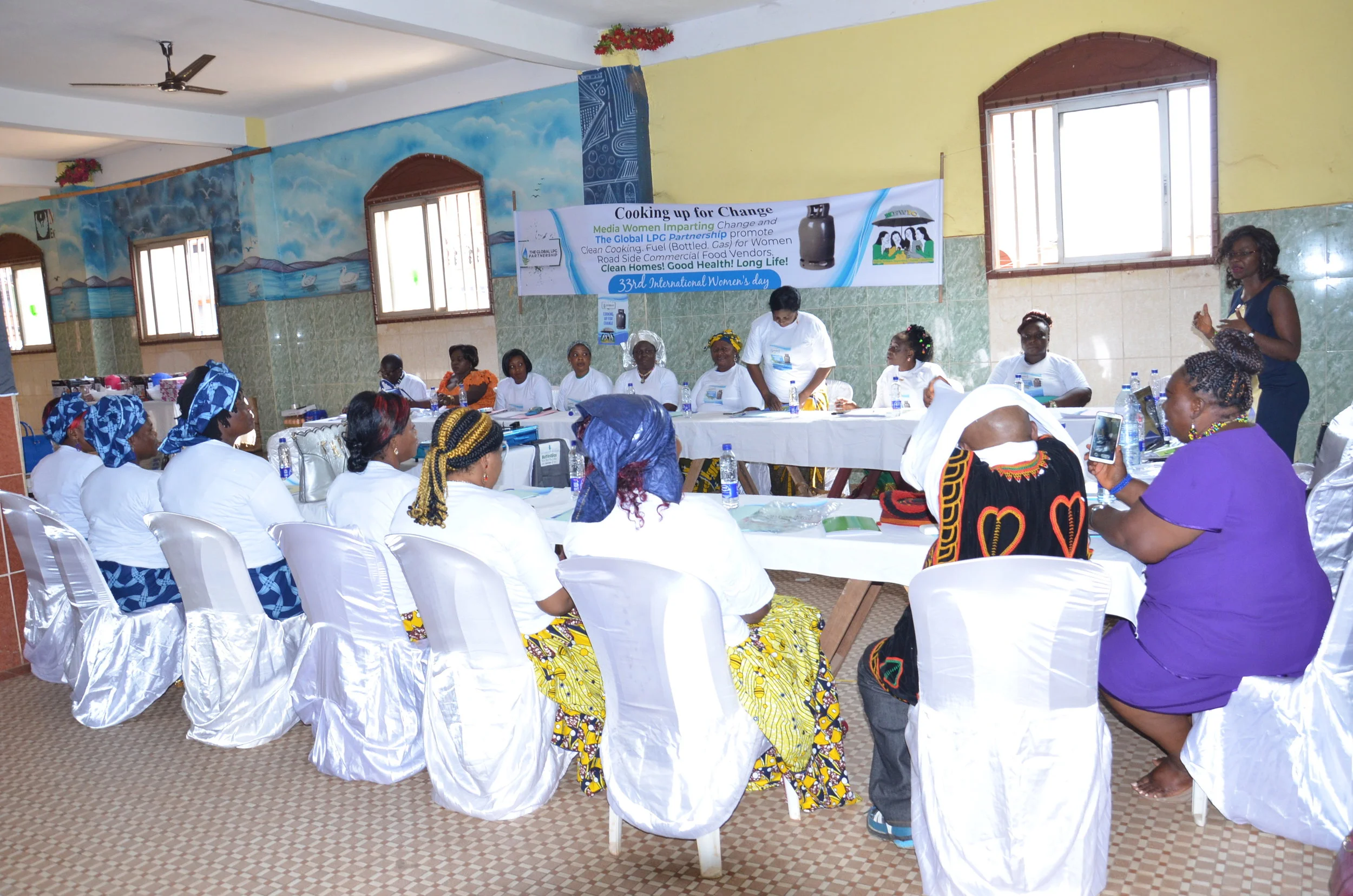GLPGP March 2018 Newsletter
Message from Alex Evans, Chairman, Operating Committee
Dear Friends,
The GLPGP team began 2018 with a burst of advocacy, education, on-the-ground impact, and team growth.
We launched a five-fold expansion of our microfinancing program in Cameroon and facilitated numerous intercontinental, South-South LPG knowledge exchange visits for the government of Ghana, at its request. Ghana is working urgently to prepare a national transition to a new, pro-growth, pro-safety national LPG market model.
GLPGP leaders travelled to venues such as Ranchi, India, and Bangkok, Thailand, to share in global fora about LPG development for clean cooking and the evidence base that justifies and motivates the work of GLPGP to help achieve UN Sustainable Development Goal 7.
Through our ongoing work supported by the EU through KfW, we added two senior experts to our core advisory team and have re-engaged for a multi-country set of studies of LPG demand-potential and social impact with Dalberg Global Development Advisors.
GLPGP will also have a substantial presence at the upcoming Sustainable Energy for All Forum in Lisbon on 2-3 May 2018. We look forward to seeing many of you there – please save the date, and please stop by our booth.
Please read on — and don’t forget to follow us on Twitter @globalLPG.
Update on Bottled Gas For Better Life
GLPGP STAFF REGISTER PARTICIPANTS FOR PHASE II OF BOTTLED GAS FOR BETTER LIFE AT THE OFFICES OF MICROFINANCE PARTNER, MUFFA, IN DOUALA, CAMEROON.
Registration began in February, 2018 for Phase II of Bottled Gas For Better Life, the microfinance program launched in 2017 in Cameroon by GLPGP in partnership with local microfinance institutions and implementing partners, with support from international donors including the OPEC Fund For International Development. In Phase II, a total of 800 families across five regions of Cameroon will receive loans and LPG start-up kits.
The program offers small loans that enable households with low or seasonally variable incomes to spread the upfront cost of LPG household equipment – including stove, cylinder, regulator and hose – across several smaller payments. The pilot phase of 150 households in southwest Cameroon, which concluded in October 2017, resulted in 94% of total loaned capital repaid. Recorded LPG usage was 22.9 kg per person per year (annualized with 8 months’ usage) as compared to the national average of around 4 kg per person per year, and consistent with international norms for use of LPG as the primary cooking fuel.
Phase II of Bottled Gas For Better Life is co-funded by GLPGP and the OPEC Fund for International Development. GLPGP is preparing a similar program in Kenya for launch in mid-2018.
Cooking Up For Change Public Awareness Event for International Women’s Day
cooking up for change public awareness event in Yaoundé, cameroon, march 3, 2018
To mark International Women’s Day, GLPGP’s Cameroon team partnered with Media Women Imparting Change, a Yaoundé-based nonprofit, to organize a public awareness event on March 3, 2018. The event, Cooking Up For Change, encouraged commercial food vendors to switch to clean cooking with LPG. Food vendors are exposed for long hours each day to health hazards from cooking with solid fuels.
Health expert, Dr. Dorah Tanyi-Tiku Makia, and gender activist, Ms. Joan Tanyi-Ashu, spoke to the vendors about the benefits of cooking with LPG – faster cooking, precise heat control, time and money savings, improved health, and a cleaner kitchen environment. A cooking demonstration with LPG was given. GLPGP also gave an overview of its LPG microfinance program.
Op-Ed: Access to sustainable energy is key to progress for women and girls
On International Women’s Day, Devex published an opinion piece by Richenda Van Leeuwen, GLPGP’s Chair, International Institutions. Her article outlines how the lives of women and girls can be improved by bringing sustainable energy sources into their homes and communities.
As both energy providers and consumers, women will not only benefit from access to clean fuels like LPG, but also are valuable partners in leading concrete commitments towards achieving Sustainable Development Goal 7. Read the full article here.
Expert Voices: Renzo Bee on Building Sustainable LPG Markets in West Africa
Ahead of the Argus West Africa LPG 2018 conference on 9-10 May in Accra, Ghana, Argus Media published an interview with Renzo Bee, GLPGP’s Chair, Policy, Regulation and Development Advisory Group. Mr. Bee discussed the challenge of getting sustained investment in cylinders by LPG companies, a pre-requisite for scaling up the LPG market and improving distribution to underserved areas.
He added that this was the main obstacle to rapid, sustainable growth of emerging LPG markets – more so than infrastructure limitations such refilling and storage capacity. Cylinder investment is encouraged when countries put in place the Sustainable LPG Market Model. The Model describes the essential regulations and market rules that enable large-scale market development, such as giving LPG marketers ownership and responsibility for own-branded cylinders and building out distribution networks, and ending practices such as micro-filling that discourage cylinder investment and erode safety. Ghana is taking urgent steps to transition its national LPG market towards this Model. Read the full interview here.
South-South Study Missions with Ghana Government Delegation to Countries Successfully Practicing the Sustainable LPG Market Model
The government of Ghana, led by the National Petroleum Authority (NPA), is pushing ahead with planning to transition its LPG sector to the Sustainable LPG Market Model, to improve safety and cylinder distribution. In December 2017, the NPA requested GLPGP to facilitate and accompany the National LPG Task Force on country study trips to foster knowledge exchange with other markets that have implemented the Model.
GLPGP lead technical expert Renzo Bee traveled with Ghanaian government officials to Morocco, Senegal, Colombia and Peru to hold discussions with relevant leaders of national government agencies, LPG industry associations and leading LPG companies carrying out critical functions of the national LPG supply chains.
MR. RENZO BEE, CHAIR, POLICY, REGULATORY & DEVELOPMENT ADVISORY GROUP, LEADS A GOVERNMENT DELEGATION FROM GHANA TO MEET KEY LPG SECTOR STAKEHOLDERS IN COLOMBIA , MARCH 2018.
Policy brief: Climate and Health Impacts of Scaling Adoption of LPG for Clean Cooking Through the Cameroon LPG Master Plan
The University of Liverpool has published a policy brief using results from a recent study with the Centre for International Climate and Environmental Research sponsored by the African Development Bank. The study modeled the health and climate impacts of scaling LPG adoption for clean cooking to 58% of the population by 2030 through the country's national LPG Master Plan, developed in 2016 with GLPGP.
The brief noted that in 2016, 7% of all deaths in Sub-Saharan Africa and 6.7% in Cameroon were attributable to household air pollution from burning polluting fuels. Switching from biomass to LPG for domestic fuel use in line with the Master Plan target for 2030 is projected to save 23,000 lives and avert 760,000 disability-adjusted-life-years (i.e. healthy years of full productivity and life quality), compared to current trends in LPG adoption and use. Implementation of the Master Plan is expected to reduce the emissions of short-lived climate pollutants like black carbon and methane by more than a third, and ultimately avert 4.5-7.6 million tons of CO2-equivalent over a 100-year time horizon. This will have a net cooling effect of -0.10 millidegree centigrade (milli °C) in 2030. By 2100, assuming LPG continues to be the fuel used by the majority of the population, a global cooling effect of -0.70 milli °C - 0.93 milli °C is forecast.
Webinar: Supporting Better Health Through Cooking with LPG
On March 15, 2018, GLPGP and the Climate and Clean Air Coalition co-hosted a webinar, Supporting better health through cooking with LPG: Programs for low-income communities in Kenya, Peru and Cameroon. GLPGP is a member of the Coalition.
The webinar showcased ongoing initiatives to improve LPG consumer financing for low-income communities. Richenda Van Leeuwen introduced GLPGP's work. Elizabeth Muchiri, GLPGP’s Country Manager for Kenya, then discussed the National Oil Company of Kenya’s Mwananchi Gas program, which aims to distribute 4.8 million LPG cylinders to Kenyan households by 2020. Dr. Suzanne Pollard and Kendra Williams, researchers at the Johns Hopkins School of Medicine, presented their evaluation of the Peru government’s FISE program, which encourages LPG use by poor populations. Dr. Dan Pope from the University of Liverpool, a GLPGP research partner in Cameroon, concluded the webinar by sharing results from an independent evaluation of LPG adoption and resulting health benefits in the communities of southwest Cameroon where the GLPGP Bottled Gas For Better Life microfinance pilot took place in 2017.
Watch the video recording of the webinar here. Make sure to follow us on Twitter @globalLPG for announcements on the next in the webinar series.
Conferences and Events
SET4Food Seminar – Rome, Italy, January 18
Renzo Bee, GLPGP’s Chair, Policy, Regulation and Development Advisory Group was a speaker at the SET4Food Seminar on the role of energy in bridging the humanitarian and development divide, hosted at the Food and Agricultural Organization's headquarters. Citing GLPGP’s engagement in Cameroon, Mr. Bee discussed the role of GLPGP in helping countries define their national LPG master plan which includes an investment plan (cylinders, filling plants, depots) for the private sector and a road map of policy and regulatory reforms including LPG pricing, licensing, and safety standards.
Mr. Bee also shared the key advantages to improving LPG distribution in cylinders, including high energy density, portability, safety, and time-saving for daily cooking. Countries should create an environment that encourages cylinder investment and avoids common anti-development problems such as interchangeability of cylinders (between LPG companies), exchange pool schemes, and pirate filling of cylinders. LPG affordability can be improved through supply chain improvements, economies of scale, price regulation, microfinance programs, and payment innovations such as PAYGO.
Global SDG 7 Conference – Bangkok, Thailand, February 21-23
John Hauge, GLPGP's Chief Financial Officer, moderated a panel on The Growing Role of LPG in Clean Cooking for SDG 7 at the Global SDG 7 Conference in February 2018, organized by UN DESA and UN ESCAP. The panel brought together senior representatives from India, a country massively scaling up LPG adoption, and international organizations active in facilitating and financing such changes.
Mr. Hauge was joined by panelists Ashutosh Jindal, Joint Secretary at India’s Ministry of Petroleum & Natural Gas, Marcel Alers, Head of Energy, UN Development Programme, and Sheila Oparaocha, Executive Director, ENERGIA.
The panelists noted that people in developing countries' populations want LPG, and political commitment – as seen in India’s experience – is instrumental in achieving this. LPG is the most promising clean cooking solution in urban contexts, and increasingly accessible and affordable in rural contexts as well. As the primary cooks in most households, women in particular must be front and center in energy decision-making. Given socio-cultural constraints on women in some countries, useful tools for their empowerment can include targeted subsidies, involving women in LPG supply chains, leveraging community groups to mobilize consumer financing, as well as education to correct user misperceptions about the relative cost of LPG compared to other cooking fuels.
Read our summary of the side event here.
Ms. sheila oparaocha, Mr. john hauge and Mr. marcel alers speak at the global sdg 7 conference, bangkok, thailand, february 2018.
LPG: Catalyst of Social Change Conference – Ranchi, India, February 26-27
Mr. John Hauge speaks at the LPG: Catalyst for Social CHange Conference in Ranchi, India, February 2018.
At the LPG: Catalyst for Social Change Conference in Ranchi, India, GLPGP CFO John Hauge moderated a panel on Ujjwala: Global Perspective.
Dr. Walt Hart, Vice President at IHS Markit, noted that India is now second in the world (at 15%) in residential/ commercial LPG demand, and that India will remain a net importer of LPG. Radha Muthiah, CEO, Global Alliance for Clean Cookstoves, explained how her organization’s experience helping households in bettering their lives using improved cookstoves could be applicable to South-South cooperation. Christopher Beaton, Senior Policy Advisor, International Institute of Sustainable Development, contrasted India’s well-targeted LPG subsidy scheme with costly, ineffective and distortive energy subsidies used by other countries in the past for gasoline, diesel, and coal.
LPG Europe Summit 2018 – Lisbon, Portugal, March 7-8
Renzo Bee, GLPGP’s Chair, Policy, Regulation and Development Advisory Group presented on LPG development in Sub Saharan Africa at the LPG Europe Summit 2018. Mr. Bee discussed the importance of an LPG “master plan” to coordinate public and private sector stakeholders in a country seeking to develop and expand its LPG markets. Such a plan would include enhancements to the regulatory framework, and an investment project pipeline to improve LPG distribution.
Sustainable Energy Forum for East Africa 2018 – Kigali, Rwanda, March 19-21
Elizabeth Muchiri, GLPGP's Kenya Country Manager, spoke on a panel about clean fuels and technologies for cooking at the Sustainable Energy Forum for East Africa 2018. She noted that the demand for LPG as a modern cooking fuel is clear; LPG is no longer a fuel for the rich and elite as it is now affordable and plentiful. The key challenge is to incentivize the private sector to (i) invest in cylinders so that the distribution network extends beyond key urban areas, and (ii) take responsibility for ensuring cylinder maintenance and consumer safety. Economies of scale should be utilized for storage and filling plants. Ms. Muchiri also discussed the national and community level interventions led by GLPGP to help countries build sustainable LPG ecosystems. Panelists included senior representatives from Project Gaia, Inyenyeri, UNIDO, and KOKO Networks.
Upcoming: Sustainable Energy For All Forum – Lisbon, Portugal, May 2-3
GLPGP will be participating in the global Sustainable Energy For All Forum in Lisbon, Portugal in May. Bessem Enonchong, GLPGP's Cameroon Country Director, will be a lead speaker during a Deep Dive session on May 2, where she will outline Cameroon’s steps to increase LPG access to 58% of the population by 2030. GLPGP will also co-host a Partner Working Session, focused on Clean Cooking Fuels for SDG 7, moderated by Richenda Van Leeuwen, GLPGP’s Chair, International Institutions. The session will focus on the financing solutions and full value-chain development (including cross-cutting approaches across competing fuels) needed to significantly improve access to clean cooking fuels.
Follow us on Twitter @globallpg for further updates, and connect with us at the Forum, where we will also have a booth to showcase our work: Come and see us there!
GLPGP Welcomes New Team Members
With funding from the European Union, administered by KfW, additional consultants have been engaged in senior advisory roles in the Clean Cooking for Africa Project. GLPGP is the project implementing agency.
Mr. Gilles Bruneval will focus on Engineering, Procurement and Construction for LPG infrastructure projects in GLPGP focus countries Cameroon, Kenya, Ghana. Mr. Bruneval has more than 20 years of experience in the LPG sector, first for SHV GAS Group and later as an independent consultant. In various roles at SHV GAS, Mr. Bruneval had technical responsibilities focused on LPG storage, marine terminals, filling plants, tanks and cylinders construction, and logistics in multiple countries. For the last 8 years, as an independent consultant, his work has focused mainly on LPG project construction in Africa. Said Mr. Bruneval, "I am convinced of LPG’s potential to bring modernity and economic development." He lives in France.
Mr. Derek Saleeby will focus on defining financial structures for mobilizing and deploying development (concessional) capital in LPG investment projects facilitated by GLPGP. Mr. Saleeby’s background is in banking, capital markets and investing in both emerging and developed markets across numerous sectors and capital structures. He has structured transactions using combinations of commercial, DFI and impact oriented capital structures and investment vehicles, working with banks, investment funds, DFIs, IFIs, and others. Mr. Saleeby was a co-founder of TOTAL Impact Capital, a global advisory and impact investments firm, where he remains a Managing Partner. His previous service includes Chief Investment Officer of a hedge fund of funds and senior positions with global firms such as Citibank, Salomon Smith Barney, Spain’s Banco Bilbao Vizcaya (Latin America), RAM Capital, and Deutsche Bank Asset Management/RLJ. Mr. Saleeby has a BA in Economics and Politics with African Studies from Princeton University and an MBA from Harvard Business School.
Dalberg Global Development Advisors will undertake evaluations of LPG demand potential in Cameroon and Kenya (Ghana having been studied in 2017), and the social and environmental impact potential of serving the potential LPG demand under the Sustainable LPG Market Model in all three countries. Dalberg will work closely with Dr. Elisa Puzzolo, GLPGP's Director of Research, Monitoring and Evaluation, and other GLPGP experts and staff in its work.







